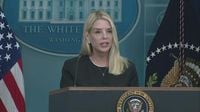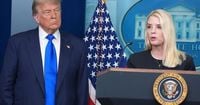On June 27, 2025, the United States Supreme Court delivered a pivotal 6–3 ruling that significantly limits the power of lower federal courts to issue nationwide injunctions blocking presidential executive orders. This decision marked a major victory for President Donald Trump and his administration, particularly regarding the controversial executive order aimed at ending birthright citizenship in the U.S.
The ruling did not settle the constitutionality of Trump’s birthright citizenship policy itself, but it curtailed the ability of lower courts to impose sweeping nationwide pauses on its enforcement. This means that, starting as soon as July 2025, the executive order may begin to take effect in some states, despite ongoing legal challenges. The Supreme Court’s conservative supermajority left the door open for the Trump administration to move forward with its immigration agenda, at least temporarily.
At a White House press conference held shortly after the ruling, Attorney General Pam Bondi praised the court’s decision. She described it as a long-overdue check on what she called “rogue judges” issuing “lawless injunctions” that had effectively turned district courts into an “Imperial judiciary.” Bondi emphasized that the ruling restores the President’s authority to implement his policies without being blocked nationwide by judges in a handful of districts. “Americans are finally getting what they voted for,” Bondi declared, standing alongside President Trump.
Bondi also highlighted that 35 of the 40 nationwide injunctions issued against Trump’s policies over the previous five months originated from just five of the 94 federal judicial districts. She framed the issue as bipartisan, noting that nationwide injunctions have been a persistent problem across five presidencies, but argued that the Supreme Court’s ruling would stop the “endless barrage” against Trump’s agenda.
President Trump himself took to Truth Social to celebrate the decision as a “GIANT WIN,” especially pointing to the impact on the “Birthright Citizenship Hoax.” Vice President JD Vance and former Fox News host Megyn Kelly also lauded the ruling on social media, with Kelly calling it a “HUGE W FOR TRUMP!!” Meanwhile, the Congressional Hispanic Caucus condemned the ruling as a “dangerous step backward” that undermines courts’ ability to protect communities and attacks birthright citizenship.
Despite the court’s ruling on injunctions, the fate of birthright citizenship remains unsettled. Bondi told reporters that the Supreme Court is expected to decide on the constitutionality of the executive order during its next session in October 2025. She acknowledged that the court could still issue a ruling sooner, but for now, the legal battle continues. The Trump administration’s position is that children born in the U.S. to undocumented immigrants are not “subject to the jurisdiction” of the country under the 14th Amendment and therefore should not automatically receive citizenship.
This executive order, signed by Trump on his first day in office, challenges a longstanding interpretation of the 14th Amendment that grants citizenship to anyone born on U.S. soil—a principle known as jus soli, or “right of the soil.” The U.S. is one of about 30 countries, mostly in the Americas including Canada and Mexico, that apply birthright citizenship. Opponents of Trump’s policy, including states, immigrant advocacy groups, and civil rights organizations, argue that the order unsettles this widely accepted constitutional understanding.
So far, judges have uniformly ruled against the Trump administration on the merits of the birthright citizenship executive order, but the Supreme Court’s recent decision restricts lower courts from applying these rulings broadly across the nation. The Department of Justice argued that individual judges do not have the authority to impose nationwide injunctions that affect areas beyond their jurisdiction, a position that found favor with the Supreme Court.
During the press conference, when asked how the administration would enforce the birthright citizenship policy—specifically who would be responsible for vetting citizenship status—Attorney General Bondi declined to provide details, citing the ongoing litigation. She promised more information in October when the Supreme Court will hear the case, if it agrees to do so. When pressed whether undocumented babies would be an enforcement priority, Bondi deflected, stating that violent criminals are the current priority for immigration enforcement.
Her comments, however, contrast with data from the Cato Institute, which shows that Immigration and Customs Enforcement (ICE) primarily detains individuals without criminal convictions and that even those with convictions are overwhelmingly not violent offenders. Bondi insisted that the ruling would allow the administration to deport gang members more effectively, asserting that no district court judge could claim to be an emperor over the executive branch.
The Supreme Court’s ruling on June 27 represents a turning point in the ongoing battle over presidential authority and judicial power in immigration policy. By limiting nationwide injunctions, the court has empowered the Trump administration to push forward with its immigration agenda, at least in certain jurisdictions, while the broader constitutional questions remain unresolved.
As the nation awaits the Supreme Court’s full decision on birthright citizenship, expected in the fall, the controversy continues to ignite fierce debate. For many, the ruling signals a shift toward greater executive power, while for others, it raises concerns about the judiciary’s ability to check potentially overreaching policies that affect millions of people born on American soil.


